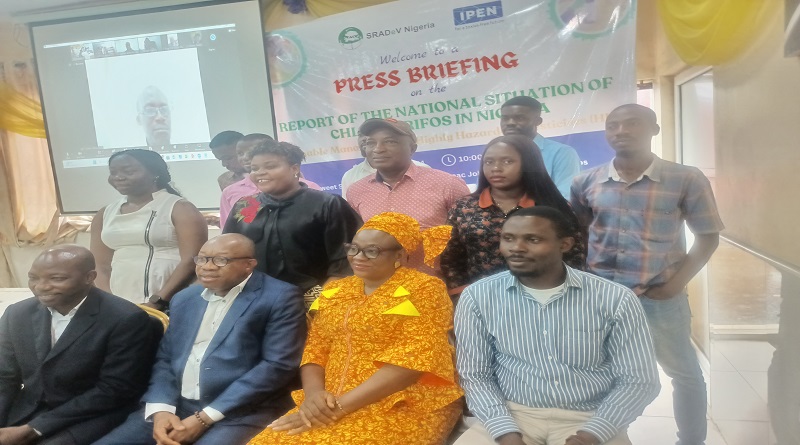Chlorpyrifos: SRADev tasks FG, stakeholders on collaboration to phase out hazardous pesticides
Considering the severity of the threat of Chlorpyrifos to health and environment, SRADev Nigeria has called on the Federal Government to collaborate with other stakeholders in the fight to stop the importation and usage of highly hazardous pesticides (HHPs) in the country.
SRADev also suggested other measures to address the problem of chlorpyrifos use and its poisoning.
Speaking at a press briefing to formally release to the public the organization’s study on “The National Situation of Chlorpyrifos in Nigeria, implemented under the auspices of the International Pollutants Elimination Network (IPEN), the Executive Director of SRADev Nigeria, Dr. Leslie Adogame, made an urgent call on the Nigerian government, especially the National Agency for Food and Drug Administration and Control (NAFDAC) to commence monitoring and pharmaco vigilance activities towards identifying the trade on chlorpyrifos and ensure punitive measures is taken.
According to him, NAFDAC and National Environmental Standards Regulation and Enforcement Agency
(NESREA) should immediately commence a national awareness raising activities with the Federal Ministry of Agriculture and Food Security on the banned state of chlorpyrifos.
Besides, he urged that Nigeria government should facilitate the access to certification services.
He said: “There is no government approved certifying body yet to standardize products and ensure compliance with organic production system. Awareness or advocacy on organic agriculture must be raised to de-emphasise conventional agricultural practices.
“Organic agriculture should be inculcated into the educational curriculum. Specialised institutions involved in training for organic agriculture should be financially supported.”
He said there was a need for collaboration within and between Customs, Nigerian Police Force to track and arrest illegal import of the pesticides beyond the ban implementation.
Besides, he urged government to urgently reactivate extension officers under the Agricultural Development Programme (ADP) to provide information on agroecology/organic farming in Nigeria.
He said the public must be aware of dangers inherent in pesticides (HHPs) use particularly chlorpyrifos for enhance Agricultural Sustainability in Nigeria towards attaining the SDG goals.
Adogame defined Highly Hazardous Pesticides (HHPs) as pesticides acknowledged to present particularly high levels of acute or chronic hazards to health and the environment according to internationally accepted classification systems such as the World Health Organization (WHO) or the Global Harmonized System of Classification and Labelling of Chemicals (GHS) or their listing in relevant binding International Agreements and Conventions.
“In addition, they are known to cause severe or irreversible harm to health or the environment under conditions of use in a country that may be considered to be and treated as highly hazardous,” he said.
He also defined chlorpyrifos as a broad-spectrum organochlorine pesticide (OCP), class of chemicals that were first developed by the Nazis for chemical warfare and later adapted for commercial pesticide use after the break-up of the Nazi chemical apparatus, now been in products for uses that can be broadly divided into agricultural uses for food and feed crops, agricultural uses for non-food crops; veterinary uses; and uses in residential settings, industrial uses or public health applications.
“The majority of uses are in commercial agricultural settings. Chlorpyrifos is used globally, although 15 countries plus the European Union (EU) have completely banned the use of Chlorpyrifos, and its use is under review in several countries, “he said
He explained that a wide range of commercial products containing chlorpyrifos have been identified, with many individual trade names indicated specified.
“Although data on total global production volumes are unavailable, information from the CCPIA (2022) said the global use is estimated to be 50,000 tonnes/year.
“Commonly available brands in Nigeria include: Massacre (20% Chlorpyrifos), Kolar (20%), Terminator (50% Chlorpyrifos/5% Cypermethrin), Predator (Chlorpyrifos 50% EC) and ACT FORCE 55 (Chlorpyrifos 35 % Cypermethrin 10 % EC), ” he said.
This study, Adogame said was one of SRADev’s activities in espousing the nation situation of chlorpyrifos, its imports, use and impact in Nigeria carried out in six months (June – November 2022) as part of its national campaign and awareness towards sustainable management and the promotion of safer alternatives in Nigeria.
According to him, the project’s goal was essentially to establish the current status of chlorpyrifos use and the promotion of safer alternatives in Nigeria, to inform policy implementation in Nigeria.
Deputy Director, Department of Pollution Control and Environmental Health, Mrs Olabimpe Adenaike, who represented the Minister of the Federal Ministry of Environment, enjoined all stakeholders, Federal Ministry of Health, Federal Ministry of Agriculture and their agencies, Nigeria Customs Service, Inter-Governmental Organizations (IGOs), Non-Governmental Organizations (NGOs), farmers, academia, trade unions, civil society and private sector to collaborate and timely address HHP which Chlorpyrifos is included.
The minister urged that they should ensure that these pesticides are progressively banned and entirely phased out, while also promoting good agricultural practices, ensuring environmentally sound disposal of stockpiles of obsolete pesticides and capacity building.
Other stakeholders at the press briefing included officials from the Lagos State Agric Input Agency, IPEN, university lecturers and researchers, among others.
Adogame also highlighted the health and environment dangers of Chlorpyrifos, saying the pesticide exposure has both human and environmental health consequences ranging from tearing of the eyes, runny nose, increased saliva and sweat production, nausea, dizziness and headache, adding that signs of progression included muscle twitching, weakness or tremors, lack of coordination, vomiting, abdominal cramps, diarrhea, and pupil constriction with blurred or darkened vision.
“Signs of severe toxicity include increased heart rate, unconsciousness, loss of control of the urine or bowels, convulsions, respiratory depression, and paralysis.
“Exposure to environmental media disruption of ecosystem of environmental media including beneficial soil microorganisms and insects, non-target plants, fish, birds, and other wildlife.
He said there were existence of significant research findings in Nigeria, which indicated the presence of concentrations of chlorpyrifos residues in vegetables like spinach, lettuce, cabbage, tomato and onion.
This finding, he said could be responsible for many cases of alterations in carbohydrate and lipid metabolism and organ damage in humans in Nigeria.
“Acute and chronic pesticide poisoning usually results from: consumption of contaminated food, chemical accident in industries and occupational exposure in agriculture,” he said.
He pointed out that annual importation of chlorpyrifos rose to 1,064,772 litres and over 538 tonnes in 2019 into the country.
Across all 46 countries in the sub-Saharan Africa, he said the Food and Agriculture Organization (FAO) of the United Nations estimated that the use of pesticides increased by 150 per cent times between 2006 and 2019, attaining over 100,000 tons per year.
“Chlorpyrifos effectively controls boll worms, cutworms, white grub, termites, borers on crops like cotton, vegetables, paddy, and fruit trees.
“In Nigeria, it is used on fruit and vegetable crops to manage crop pest especially insects. Such crops include watermelon, spinach ,sorrel (Zobo) hibiscus sabdariffa, rice paddy. Generally, it is found also used in apples, citrus, wheat,cherries, peaches, soyabeans, cotton, oranges, broccoli just to mention a few,” he said
According to Adogame, the level of use had resulted in negative health, environmental and economic consequences in Nigeria and around the world.
“Yet, the proper registration of pesticides, their sustainable management and the promotion of safer alternatives are clearly lacking. Sufficient information exist that Nigeria imports chlorpyrifos majorly from China and India,” he said, adding that as at 2019, chlorpyrifos has been banned in India and been restricted in China yet exported to Nigeria.
“According to the NESREA, chlorpyrifos residues have been detected in sediments, soil, water, vegetables, foodstuff and even in human fluids. The extensive application of chlorpyrifos has caused contamination of various ecosystems like soil, sediments, water, and air and also leads to the disruption of biogeochemical cycles,” he said.
“The challenge of chlorpyrifos management in Nigeria is enormous, as farmers continuously use this very dangerous chemicals recklessly – there are no safe uses for chlorpyrifos. Indiscriminate use and over reliance on pesticides has been linked to increased risks to food safety, health of consumers and agricultural workers.
“In accordance with paragraph 9 of Article 8 of the Stockholm Convention on POPs, the POPRC recommends the Conference of the Parties to the Stockholm Convention to consider listing chlorpyrifos under the Stockholm Convention in Annex A/B with/without exemptions.
“On 7th March 2022,the Federal Ministry of Agriculture and Rural Development (FMARD) called for ban and compliance monitoring of all agrochemical products with Chlorpyrifos active 17 ingredients and variant chlorpyrifos-methyl including: Blocade, Cortilan, OleoRel, Pyrinex and Reldan22 in Nigeria.
“The Federal Ministry of Environment, being the designated national authority (DNA) for chemically related Multi-lateral Environmental Agreements (MEAs) in Nigeria, transmitted the decision to the Secretariat of the Rotterdam Convention on Prior Informed Consent on Certain Hazardous Chemicals and Pesticides in International Trade.
” In November, 2022, NAFDAC reeled out a phase-out process for chlorpyrifos which involved: stoppage for issuance of certificate for registration and renewal of the product by December 2022; product importation and field trials to be conducted and provisional permit given by January 2023; control was placed on the importation of the product authority to clear and the quantity that can be permitted issued .
“Between January 2023 and December 2023 as sensitization continued on the moratorium.The period of moratorium set was January 2024 – October 2024.
“Ban on chlorpyrifos effective from 1st November 2024. National Committee of Chemicals Management (NCCM) at its meeting on 22 May 2024, finally approved the ban of Chlorpyrifos in Nigeria,”the executive director of SRADev Nigeria said.
Fossil Fuel Companies




